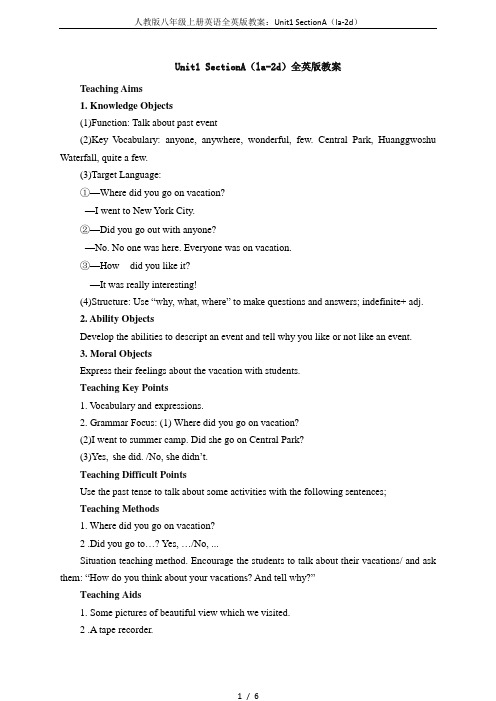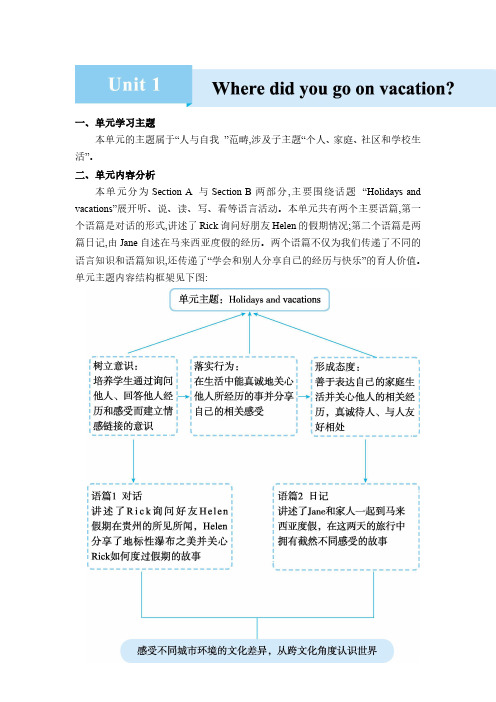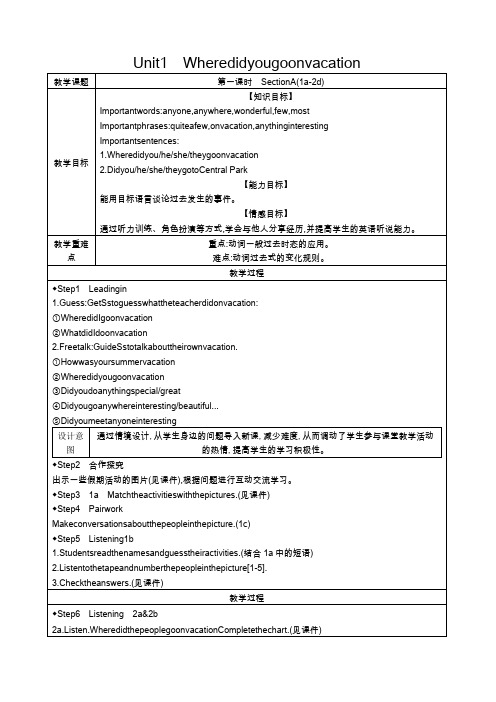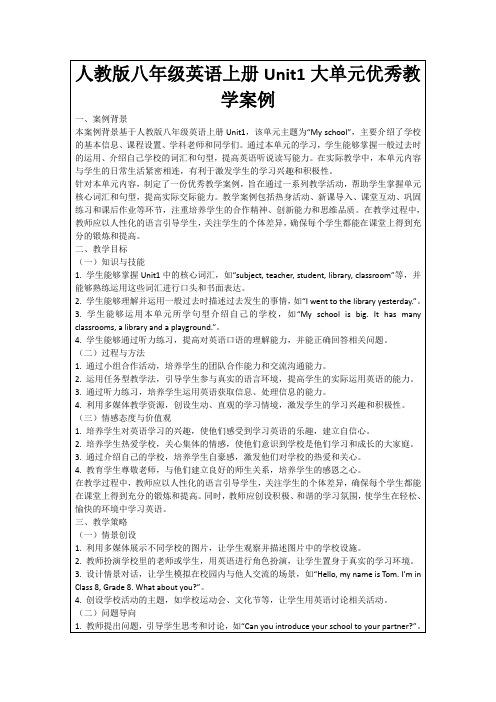【人教版】八年级英语上册 Unit 1 全单元英文教案
人教版八年级上册英语全英版教案:Unit1 SectionA(la-2d)

Unit1 SectionA(la-2d)全英版教案Teaching Aims1. Knowledge Objects(1)Function: Talk about past event(2)Key V ocabulary: anyone, anywhere, wonderful, few. Central Park, Huanggwoshu Waterfall, quite a few.(3)Target Language:①—Where did you go on vacation?—I went to New York City.②—Did you go out with anyone?—No. No one was here. Everyone was on vacation.③—How did you like it?—It was really interesting!(4)Structure: Use “why, what, where” to make questions and answers; indefinite+ adj.2. Ability ObjectsDevelop the abilities to descript an event and tell why you like or not like an event.3. Moral ObjectsExpress their feelings about the vacation with students.Teaching Key Points1. V ocabulary and expressions.2. Grammar Focus: (1) Where did you go on vacation?(2)I went to summer camp. Did she go on Central Park?(3)Yes, she did. /No, she didn’t.Teaching Difficult PointsUse the past tense to talk about some activities with the following sentences;Teaching Methods1. Where did you go on vacation?2 .Did you go to…? Yes, …/No, ...Situation teaching method. Encourage the students to talk about their vacations/ and ask them: “How do you think about your vacations? And tell why?”Teaching Aids1. Some pictures of beautiful view which we visited.2 .A tape recorder.Teaching ProceduresStep 1 Greeting (about 2 minutes)T:Good morning, class!S:Good morning, teacher!T:Do you like trip?S1:Yes.T:Where did you go on your vacation?S1:I went to....S2:I went to....S3:I went to...T:You went to so many places, but I stayed at home for two months.Objects:Review the past tense.Attention:Some students may make mistakes, the teacher should correct the sentences on the blackboard.Step 2 Presentaion (about 8 minutes)Read the new words from “anyone” to “few”. Pay attention to the word quite. Then ask some students to read it, and correct the wrong pronunciations.T:Let’s read the new words. I read onc e, you read twice.T:Now read the new words by yourself, and circle the words that you can’t read well. You have three minutes to finish it.T:Which words can’t you read well?S:Wonderful.T:Who can read for us?S2:Wonderful.T:Great. Read after me, please!Ss:Wonderful.T:Now read the word again, and pay attention to the Chinese meanings, then let’s play a game.T:I say the Chinese meanings, you say the words as quickly as you can. If your answer is right, I will give you a card. Let’s look at who can got the most cards.Then play the game.Objects:Read the new words, and know the meanings.Step 3 la, 1b (about 6 minutes)T:There are seven pictures. What did they do in every picture?Match the activities with pictures quickly. Then put up your hands, if you finish them.T:Let’s answer the questions one by one.T:Tom, Number 1.Sl:fS2:….T:There are so many persons. Let’s listen to the tape and find out who did these things. Then share your answers with other students.T:Who can show your answers, put up your hands.S1:....T:Well done.Objects:Learn the meaning of each phrase, and listen to the sentences about the past tense.Attention:Pay attention to these phrases: “visit my uncle” means visiting to my uncle. Then listen to the tape and finish lb.Ask some students to show their answers. And correct them.Step 4 Practice (about 5 minutes)Objects:Make conversations about the people in la.Attention:The teacher should show the conversation using the structures:Where did...go...?...went to....T:Let’s make conversations with your desk mate. Then practice it. After that, please come here to show us if you do the conversation the best. I will give you two cards.T:Now practice it quickly.T:Who can play your conversation? If you can come here with your desk mate and play the conversation, two cards for you.S1 and S2, play the conversation.Step 5 2a (about 3 minutes)Listen to the tape again. Complete the chart in 2a.T:Now listen to the tape again. Please find out where the people went. Pay attention to the places.Play the recording.T:Who can answer the questions? Number 1, where did Grace go?S1:She went to....Objects:Listen to the tape, and train the listening skills.Attention:Pay attention to the places which were mentioned in the sentences.Step 6 2b (about 3 minutes)Listen to the tape again. Complete the chart in 2b.T:Now listen to the tape again. In this time, listen carefully and find if she/he did the things.Play the recording.T:Who can answer the questions. Did Grace go with anyone?S1:Yes, she did.T:Did she go to…?Objects:The teacher can tell the students pay attention to the activities which the passage mentioned.Step 7 2c (about 10 minutes)Make groups with three students. Then practice the conversations.T:Read the conversation. Make clear of the meaning of each sentence. If you can91 understand the meanings, please ask me or your group member. You have two minutes. Now begin your work.T:Which sentence don’t you understand?S1:Did you go anywhere interesting?T:Who can explain the meanings?S2:….T:Excellent! If you want to modify an indefinite pronoun, you should put the adjective word at the end of the indefinite pronoun. For example, anything interesting, something fun, and so on. Are you clear now?T:You can practice the conversations according to the text. But you also can practice it according to yourself. You have three minutes to prepare it, then show us.A:Where did you go ...?B:I went to....C:Did you go with anyone?B:Yes, I went with....Some important words should be learned, e. g: anyone, anything.T: Who can practice the conversation with your partner?Objects:The past tense and indefinite pronouns.Attention:Pay attention to the structures:indefinite pronounsStep 8 2d (about 5 minutes)Read the passage and find the important sentences or phrases.Then learn the passage in groups.T:Which sentence or phrase is important?What’s the meaning of it?Please find out and write them down on your paper. You have two minutes to think it or you can discuss with your group members.After that ask some students to show what they have learned.The teacher writes down some key words. Let students recite the conversations.Objects:Recite the passage. Learn the meanings of each sentence. Play the conversation according to the key words.Attention:Let students use other words to replace the words of the passage.Step 9 Summary (about 2 minutes)In this class, we learned some important words and sentences1. Where did you go on vacation?2. Did you go with anyone?3.I just stayed at home.4. indefinite pronouns+ adj.e. g. : anything interestingStep 10 Homework (about 1 minute)Write a conversation about your vacation. Eight sentences at least.Black board DesignUnit 1 Where did you go on vacation?The First Period (Section A la—2d)1. Where did you go on vacation? 2dI went to…. Rick: ...see...2. Did you go with anyone? Helen: ...vacation...indefinite pronouns + adj. Rick: …anywhere…e, g.: anything interesting Helen: …Guizhou …Rick: …Waterfall…photos…you? ...anythi ng special…Helen: …home…。
人教版英语八年级上册 Unit 1 全单元教案

Step5Listening
Tell Ss they will hear a conversation about three students’conversations. Listen for the first time and fill in the chart. Then listenagainandcheck Yes, or No.Let Ss readthe phrases in the chart of 2b.Play the recording. Do2aand 2b.
③—Did you go with anyone?—Yes, I did./No, I didn’t.
Language points
anyone, anywhere, wonderful, quite a few, most,something, nothing, everyone, of course, myself, yourself
Key points
①一般过去时态的特殊疑问句,一般疑问句及其肯定、否定回答。
②用所学的功能语言交流假期去了什么旅行。
Difficult points
①—Where did you go on vacation?—I went to the mountains.
②—Where did Tina to on vacation?—She went to the beach.
2)阅读填空能力的提高。
Language points
英语 人教版 八年级上册(电子教案)Unit 1

一、单元学习主题
本单元的主题属于“人与自我”范畴,涉及子主题“个人、家庭、社区和学校生活”。
二、单元内容分析
本单元分为Section A与Section B两部分,主要围绕话题“Holidays and vacations”展开听、说、读、写、看等语言活动。
本单元共有两个主要语篇,第一个语篇是对话的形式,讲述了Rick询问好朋友Helen的假期情况;第二个语篇是两篇日记,由Jane自述在马来西亚度假的经历。
两个语篇不仅为我们传递了不同的语言知识和语篇知识,还传递了“学会和别人分享自己的经历与快乐”的育人价值。
单元主题内容结构框架见下图:。
人教版八年级英语上册教案unit1wheredidyougoonvacation

ThingsJanedidorsaw
Didshelikeit?(Yes/No)
Whyorwhynot?
triedparagliding
Yes.
Itwasexciting.
ateMalaysianyellownoodles
Yes.
Theyweredelicious.
walkedaroundGeorgetown
5.Workon2b&2c
Task1:ReadJane’sdiaryentriesabouthervacationandanswerthequestions.
T:Janelikestowriteadiarywhenshetravels.Let’sreadherdiaryentriesandanswerthequestions.
3.能熟练运用下列句型进行交流:Howwas...?/Howwere...?
【教学重难点】
1.掌握本课时出现的生词及表达方式。
2.进行听力训练,提高综合听说能力。
3.阅读短文,获得相关信息,提高学生们的综合阅读能力。
4.听力训练。
【课前准备】
录音机,电脑,多媒体课件。
┃教学过程设计┃
一、创设情境,切入主题
Leadin&Presentation
T:Myshoesareverycheap(写在黑板上).Theycostonly50yuan,andIlikethemverymuch.Ithinktheyarebeautiful.CanyougivememoreadjectivesthatIcanusetodescribemyshoes?
hadonebowlofriceandsomefishwithherfamily
人教版八年级上册英语全册教案

◆Step9 Challenge 挑战自我
补全对话(见课件)
设计意图
通过此环节,使学生完成 2d 中的语言目标。
◆Step10 Summary
总结本节课语言知识点(见课件)。
设计意图
梳理本课的知识要点。
◆Step11 Homework
Makeaconversationaboutwhatyoudidlastweek.
Unit1 Wheredidyougoonvacation
教学课题
第一课时 SectionA(1a-2d)
教学目标
【知识目标】 Importantwords:anyone,anywhere,wonderful,few,most Importantphrases:quiteafew,onvacation,anythinginteresting Importantsentences: 1.Wheredidyou/he/she/theygoonvacation 2.Didyou/he/she/theygotoCentral Park
◆Step7 Pairwork 2c
以小组为单位分角色表演,完成 2c。(见课件)
设计意图 加强情景交际,进一步巩固一般过去时的特殊疑问句和一般疑问句。
◆Step8 Role-playtheconversation 2d
1.Fastreading:
Read2dandanswerthequestions.(见课件)
PreviewSectionB(1a-2e)
板书设计
SectionA(GrammarFocus-3c)
指代人的不定代词
指代物的不定代词
anyone,everyone,noone
something,anything,everything,
人教版八年级英语上册Unit1大单元优秀教学案例

3.小组合作的互动性:本案例中,教师组织学生进行小组合作,共同完成任务。在小组合作过程中,学生相互交流、讨论,共同解决问题。这种方式不仅培养了学生的团队合作能力和交流沟通能力,还促进了学生的自主学习和合作学习。
3.教师对学生的学习成果进行评价,关注学生的个体差异,给予鼓励和指导。
4.设计课后作业,让学生巩固所学知识,提高英语实际运用能力。
在教学过程中,教师应以人性化的语言引导学生,关注学生的个体差异,确保每个学生都能在课堂上得到充分的锻炼和提高。同时,教师应创设积极、和谐的学习氛围,使学生在轻松、愉快的环境中学习英语。
3.鼓励小组成员相互交流、讨论,共同解决问题,如在介绍学校时遇到不会表达的词汇。
4.小组成员互评,教师进行点评,给予肯定和建议,提高学生的合作能力和团队精神。
(四)反思与评价
1.教师引导学生对自己的学习过程进行反思,如在课堂上积极参与程度、小组合作表现等。
2.学生相互评价,发现他人的优点和不足,学会欣赏和尊重他人。
人教版八年级英语上册Unit1大单元优秀教学案例
一、案例背景
本案例背景基于人教版八年级英语上册Unit1,该单元主题为“My school”,主要介绍了学校的基本信息、课程设置、学科老师和同学们。通过本单元的学习,学生能够掌握一般过去时的运用、介绍自己学校的词汇和句型,提高英语听说读写能力。在实际教学中,本单元内容与学生的日常生活紧密相连,有利于激发学生的学习兴趣和积极性。
人教版英语八年级上册Unit1Wheredidyougoonvacation教案

Unit 1 Wheredid you go on vacati on?一.必记单词1. anyone pron.(不定代词)任何人nothin g pron. (不定代词)没有什么,没有一件东西someth ing pron.(不定代词)某事;某物everyon e pron. (不定代词)每人;人人;所有人someon e pron.(不定代词)某人anywhe re adv. (不定副词)在任何地方2. wonderful adj. 精彩的;绝妙的3. few adj. & pron. 不多;很少quite a few 相当多;不少Notice:few, a few, little,a little用法a few + 可数名词肯定句a little + 不可数名词肯定句few + 可数名词否定句little + 不可数名词否定句4. most adj., adv. & pron. 最多;大多数5. myself pron.我自己;我本人yourse lf pron.你自己;您自己yourse lvespl. 你们自己Notice:反身代词第一、二人称的反身代词由物主代词加-self构成。
第三人称的反身代词由代词宾格加-self构成。
Oursel ves 我们自己himsel f 他自己hersel f 她自己itself它自己Themsel ves他们自己6. hen n. 母鸡pig n. 猪bird n. 鸟duck n. 鸭7. seem v. 好像;似乎;看来8. boredadj. 厌倦的;烦闷的9. diaryn. 日记;记事簿10. activi ty n. 活动11. decide v. 决定;选定decide to do sth. 决定去做某事12. try v.& n. 尝试;设法;努力Notice: try to do sth.与try doingsth.辨析try to do sth.(尽力、设法去做某事)表示想尽一切办法要把某事办成,强调付出一定的努力设法去完成try doingsth.(尝试着做某事)表示一种尝试、做做看的想法,不一定付出很多努力Eg.: I tried calli n g him, but no one answe red. I ’m tryin g to learn Engli s h well. 13. bicyc l e n. 自行车;脚踏车 14. build i ng n. 建筑物;房子 Notic e: build (建造,建筑)+ ing ==== build i ng(建筑物) build (建造,建筑)+ er ==== build e r(建设者,建筑者) 15. trade r n. 商人 16. wonde r v . 想知道;琢磨 17. diffe r ence n. 差别;差异 ( diffe rent adj. 不同的,有差异的) 18. top n. 顶部;表面19. wait v . 等待;等候 (wait for sb./sth. 等待某人/某物) 20. umbre lla n. 伞;雨伞21. wet adj. 湿的;潮湿的;下雨的 22. below prep.& adv . 在···下面;到···下面 反义词 above 超过;在···之上 23. enoug h adj. & adv . 足够的(地);充足的(地);充分的(地) 巧记eno u gh 在句中的位置:修饰名词很自由,可以前来也可后, 若是修饰形或副,一定后置要记住。
人教版初中英语八年级上unit1单元教案

人教版初中英语八年级上unit1单元教案Unit 1 Where did you go on vacation?适用学科英语适用年级初一授课形式一对一课时时长(分钟)120 分钟知识点1. 不定代词(some、any、no、 someone, anyone、 everyone、no one、 something、 anything, everything、nothing 等)2.Simple past tense of regular & irregular verbs.规则&不规则动词的一般过去时学习目标1.Indefinite pronouns 不定代词2.Simple past tense of regular & irregular verbs3.用过去式谈论假期活动1. 不定代词的用法以及哪些是不定代词学习重难点2. 掌握动词过去式的变化规则3. 掌握句型--where did you go on vacation?--I went to the mountains/New York/city/beach/summer camp. --Did you go with anyone?--yes,I did./No,I didn’t4. 掌握如何用过去式谈论假期的活动Unit 1 词汇篇________________________________________________________________ ___________________________________________________________________________________ ___________教学过程一、熟练掌握本单元重点词组句型。
1必背名词:bicycle 自行车;脚踏车 building 建筑物;房子 trader 商人 difference 差别; 单词差异 top 顶部;表面动词:seem 好像;似乎;看来decide 决定;选定wonder 想知道;琢磨 wait 等待;等候代词: anyone 任何人 something 某事;某物 nothing 没有什么;没有一件东西everyone 每人;人人;所有人myself 我自己;我本人yourself 你自己;您自己 someone 某人单词形容词:wonderful 精彩的;绝妙的bored 厌倦的,烦闷的enjoyable 有乐趣的; 令人愉快的 wet 湿的;潮湿的;下雨的 hungry 饥饿的副词: anywhere 在任何地方常用 1. on vacation 在度假短语:3. anything special 任何特别的东西2. stay at home 待在家里 4. study for tests 为测验而学习5. take photos 拍照6. quite a few 相当多;不少7. most of the time 大部分时间8. have a good time 玩得开心9. of course 当然;自然10. keep a diary 记日记重点 1. 谈论过去的经历:(1)---Where did you go on vacation? 句型---went to the mountains.(2) ---Did you see Huangguoshu Waterfall?---Yes, I did.2.谈论及评价食物:---How was the food?----Everything tasted really go!3.谈论旅行的感受: How did you feel about the trip?4.结果状语从句: My legs were so tired that I wanted to stop.二、知识讲解Where did you go on vacation? 你去哪里度假了? Did you go out with anyone? 你和别人一起出去的吗? Did you buy anything special? 你买了什么特别的东西吗?I went to New York City. 我去了纽约市。
- 1、下载文档前请自行甄别文档内容的完整性,平台不提供额外的编辑、内容补充、找答案等附加服务。
- 2、"仅部分预览"的文档,不可在线预览部分如存在完整性等问题,可反馈申请退款(可完整预览的文档不适用该条件!)。
- 3、如文档侵犯您的权益,请联系客服反馈,我们会尽快为您处理(人工客服工作时间:9:00-18:30)。
Unit 1 Where did you go on vacation?Language Goal 【语言目标】Learn to talk about past events:in this unit,students learn to talk about where they went and what things they did in the past.Knowledge Goals 【知识目标】Key Wordsanyone,anywhere,wonderful,few,most,something,nothing,everyone,myself,yourself,seem,bored,someone,decide,try,wonder,difference,wait,below,enough,hungry,as,dislikeKey Phrasesquite a few,of course,feel like,because of,on vacation,keep a diary,have a good time Key Sentences1.Where did you go on vacation?I went to themountains.2.Did you...?Yes,I did./No,I didn't.3.How was your vacation?Key Grammar1.“Where”cause of special questions andanswers(where引导的特殊疑问句及其回答).2.The use of indefinite pronouns(不定代词的用法).Ability Goals 【能力目标】1. Through the learning to gain the ability to talk about the past events freely with others. Enable students to write travel dairies. 2.Be able to use anything,something,anyone,everything,nothing,no one and so on.Moral Goals 【情感目标】Enable students to recall(回忆)and share their wonderful days they spent somewhere.Teaching Time 【课时】Five periodsPeriod 1 Section A(1a-2d)Period 2 Section A(Grammar Focus-3c)Period 3 Section B(1a-1e)Period 4 Section B (2a-2e)Period 5 Section B (3a-Self Check)本单元教材以Where did you go on vacation?为中心话题,围绕着描述“过去发生的事情”展开,学习和运用一般过去时态的一般疑问句Did you go/see/buy...?和特殊疑问句Where/What/How...?询问过去的事件,让学生学会谈论和分享过去发生的事件。
本课教学内容与学生的实际生活密切相关,易于引发学生运用简单的英语进行交流。
在学习活动中,学生通过交换对过去发生的事情的描述及看法,促进学生之间和师生之间的情感交流,增进情谊。
Section A的主要学习内容是:复习一般过去时态和动词的规则与不规则变化,学习一般过去时态的一般疑问句:Did you...?及不定代词的用法。
Section B安排了许多听、说、读、写的任务活动,教师在教学中可以灵活运用这些活动,将其中的一些活动进行变化或整合,充分调动学生参与的积极性,提高学生的听说读写能力。
第一课时Section A(1a-2d)Teaching Goals【教学目标】Key words & phrases:anyone,anywhere,wond erful,few,most,quite a few,go on vacationKey sentences:1.Where did you go on vacat ion?I went to the mountains/New York Cit y/summer camp/the beach.2.Did you...?Yes,I did./No,I didn't.T eaching Key Points【教学重点】The vocabulary:New York City,Central Park,few,most,quite a few,on vacationTarget language:Where did you/they/he/she go on vacation?I/They/He/She went to the mountains/New York City/summer camp/the beach. Did you...?Yes,I did./No,I didn't.Teaching Difficult Points【教学难点】Use the target language above to talk about past events.Teaching Aids【教学工具】An English textbook,a tape recorder,CAI or courseware.Teaching Steps【教学过程】★Step 1Leading inGreet the class and introduce what to learn in this period.Teacher:Welcome back to school!Did everyone have a good time during the summer vacation?Today we'll begin to learn the topic where you went on vacation.Teacher:Where did you go on vacation?Students:______.①I went to the mountains.②I visited museums.…★Step 2Pre-taskPage 1,1a & 1b.1.Look at the picture.2.Match each activity.3.Check the answers in 1b.4.Practice reading.Page 1,1c.1.Focus on the conversation in the box.2.Practice reading.3.Pairwork:Where did you go on vacation?I...4.Groupwork:Divide the class into groups of four or five. Make conversations.First S1 to S2:S1:Where did you go on vacation?S2:I...S1:Where did she/he go on vacation?S2:She/He...★Step 3While-taskPage 2,2a & 2b.1.Play the recording for the first time. Students complete the chart in 2a.2.Check the answers.(Point to one student who raises his or her hand.)3.Play the recording a second time and say:There are three conversations. The people talk about where they went on vacation. Listen to the recording and check(√)Yes,I did or No,I didn't for each question.4.Correct the answers.★Step 4Post-taskPage 2,2c & 2d.1.Focus on the conversation in 2c & 2d.2.Practice reading. Make students scan the conversations first.3.Teach and then make students role-play the conversation in pairs.4.Have a group of students present their conversation to the class.★Step 5Homework1.Practice the conversation on Page 2,2d.2.Do the exercises on Page 1 in students' book.Board Design板书设计Unit 1Where did you go on vacation?The first period Section A(1a-2d)1.Key vocabulary:anyone,anywhere,wonderful,quite a few,go on vacation 2.Target language:A:Where did Tina go on vacation?B:She went to the mountains.第二课时Section A(GF-3c)Teaching Goals【教学目标】Key words:something,nothing,everyone,myself,yourself,someone,seem,bored,diary Key phrases:go out,have a good time,of course,keep a diaryKey sentences:1.Where did you go on vacation?I went to New York City.2.Did you go out with anyone?Did you buy anything special?3.How was the food?How was your vacation?Teaching Key Points【教学重点】The vocabulary:something,nothing,everyone,myself,yourself,someone,seem,bored,diary,go out,have a good time,of course,keep a diary,on vacationTarget language:How was the food?Everything tasted really good!Did you go shopping?Of course!Did everyone have a good time?Oh,yes. Everything was excellent.Teaching Difficult Points【教学难点】e the target language above to talk about past events.2.The usage of someone,anyone,everyone,no one,something,anything,everything,nothing.Teaching Aids【教学工具】An English textbook,CAI or courseware.Teaching Steps【教学过程】★Step 1Leading in(T—teacher S—student)T:Where did you go last weekend?S:I went to the beach.T:Did you go there with anyone?S:Yes. I went to the beach with my brother.T:Did you have a good time there?S:...★Step 2Pre-taskPage 3,Grammar Focus.1.Review the grammar box. Work in pairs. One asks and the other answers.2.Practice reading the sentences in the chart.★Step 3While-taskPage 3,3a & 3b.1.Teach these new words:anyone,something,anything,everything,nothing,everyone,no one.2.Call students' attention to the conversation in 3a. Make students complete it individually.3.Choose a student to give his or her answers. Write the answers on the board.4.Correct the answers.5.Lead students to read this conversation.6.Have students work in pairs and role-play the conversation. As they talk,move around the classroom monitoring their work. Offer language or pronunciation support as needed.7.Make students complete the blanks in the e-mail message in 3b with the words in the box.8.Check the answers and then make students practice reading it.★Step 4Post-taskPage 3,3c.Complete the task in 3c.Ask your group questions about their last vacation. Then tell the class your results.★Step 5Homework1.Review the indefinite pronouns learned in this period.2.Do the exercises on Page 2 in students' book.Board Design板书设计Unit 1Where did you go on vacation?The second period Section A(GF-3c)1.The vocabulary:something,nothing,everyone,someone,myself,yourself,go out,of course2.Target language:①A:Where did you go on vacation?B:I went to New York City.②A:Did you buy anything spec ial?B:Yes,I bought something for my father.3.Structure:something special4.Answers to 3a and 3b.第三课时Section B(1a-1e)Teaching Goals【教学目标】Key words:delicious,exciting,terrible,expensive,cheap,boringKey sentences:1.Where did Lisa go on vacation?2.Did she do anything special there?Did she buy anything for her best friend?Did Lisa like her vacation?3.How was/were...?Teaching Key Points【教学重点】The vocabulary:delicious,exciting,terrible,expensive,cheap,boringTarget language:Where did Lisa go on vacation?Did she do anything special there?Did she buy anything for her best friend?How was/were...?Teaching Difficult Points【教学难点】1.询问去过何地以及感受(评价)Where did you go?I went to the beaches. How was it?It was exciting.2.Use the target language to talk about your past events.Teaching Aids【教学工具】An English textbook,a tape recorder,CAI or courseware.Teaching Steps【教学过程】★Step 1Leading in1.Greetings.2.T:Where did you go on vacation?S:I went to summer camp.T:Did you do anything special there?S:Yes,I...T:Did you buy anything for your parents or friends?S:Yes,I bought...for.../No,I bought nothing.T:How was/were...?S:It was/They were...★Step 2Pre-taskPage 4,1a & 1b.1.Look at the six pictures.2.Match the words with the pictures.3.Students complete the task in 1b individually.4.Check the answers.★Step 3While-taskPage 4,1c & 1d.1.Make students scan the questions in 1c.2.Play the recording for the first time. And say:Listen to the tape. Lisa is talking about her vacation. Complete the four questions.3.Play the recording a second time. Students complete the task in 1d.4.Correct the answers.★Step 4Post-taskPage 4,1e.Ask 3 or 4 students to answer questions about Lisa's vacation. You can begin your questions with:Where did...?What did...?Did she...?How was...?How were...?★Step 5Homework1.Review these sentences:Where did...?Did...?How was/were...?2.Do the exercises on Page 3 in students' book.Board Design板书设计Unit 1Where did you go on vacation?The third period Section B(1a-1e)1.Words:delicious,exciting,terrible,expensive,cheap,boring2.Sentences:①Where did Lisa go on vacation?②Did she buy anything special?③Did she buy anything for her best friend?④Did Lisa like her vacation?3.Answers to Activity 1a:1—5 f a c e b dAnswers to Activity 1b:wordsdeliciousexcitingcheapwordsterribleexpensiveboring第四课时Section B(2a-2e)Teaching Goals【教学目标】Key words:activity,decide,try,bird,bicycle,building,trader,wonder,difference,top,wait,umbrella,wet,below,enough,hungry,asKey phrases:feel like,because of,go to the beach,a lot of,a little,take the train,too many,what aboutKey sentences:1.I wonder what life was like here in the past.2.What a difference a day makes!3.We waited over an hour for the train because there were too many people.Teaching Key Points【教学重点】Learn Jane's diary entries about her vacation.1.The vocabulary:activity,decide,try,wonder,difference,wait,below,enough,hungry,as,feel like,because of2.Target language:I wonder what life was like here in the past. We waited over an hour for the train because there were too ma ny people.Teaching Difficult Points【教学难点】1.because and because of2.What a difference a day makes!3.Learn to write a diary.Teaching Aids【教学工具】An English textbook,CAI or courseware.Teaching Steps【教学过程】★Step 1Leading in1.Greetings.2.Introduce what to learn in this perio d,especially the articles in 2b,Jane's diary entries. Teacher begins like this:Today we'll focus on two diary entries about Jane's vacation. Through the learning you'll know how to write a diary. Let's begin now.★Step 2Pre-taskPage 5,2a & 2b.1.Review and discuss the questions in 2a box with your partner.2.Project these new words on the screen or write them on the board and teach the new words. Ask students to repeat them. And make sure everyone knows the meanings.activity n.活动;decide v.决定;try v. & n.尝试,设法;wonder v.想知道;difference n.差异;top n.顶部;wait v. & n.等待;umbrella n.伞;below prep. & adv.在……下面;enough adj.充足的;hungry adj.饥饿的3.Make students scan the articles first. Ask students to put a mark in contents that are unfamiliar to them. Then the teacher lead students to learn these two articles sentence by sentence. Pay attention to these points:(1)decide v.决定;decide to do sth.决定做某事;(2)try v.尝试;try doing sth.尝试做某事;try to do sth.尽力做某事;(3)below prep. & adv.在……下面;(4)feel like 给……的感觉;(5)because and because of;(6)wonder v.想知道4.Practice reading.★Step 3While-taskPage 6,2c & 2d.1.Make students read Jane's diary entries again. Fill in the chart in 2c.2.Students complete the conversation in 2d using the information in Jane's dairy entries.3.Choose 3 or 4 students to give their answers.4.Correct the answers.5.Have students work in pairs. Student A will be Anna and student B will be Jane. Act the conversation out.★Step 4Post-taskPage 6,2e.1.Ma ke students complete the blanks in 2e.2.Ask one student to write his or her answers on the board.3.Check the answers together with the class.4.Practice reading.★Step 5Homework1.Write a diary.2.Do the exercises on Page 4 in students' book.Board Design板书设计Unit 1Where did you go on vacation?The fourth period Section B(2a—2e)1.Key vocabulary:decide,try,wonder,difference,top,wait,below,enough,hungry,as,feel like,because of,too many2.Sentences:①I wonder what life was like here i n the past.②And because of the bad weather,we couldn't see anything below.第五课时Section B(3a-Self Check)Teaching Goals【教学目标】Key words & phrases:duck,dislike,take photos,Tian'anmen Square,the Palace Museum,bring back,shopping center,have a fun time,school trip,come upKey sentences:1.How did you feel about the trip?2.It was so beautiful tha t we forgot about the last five hours!Teaching Key Points【教学重点】The vocabulary:dislike,take photos,Tian'anmen Square,the Palace MuseumTarget language:What did you like best?Did you dislike anything?How did you feel about the trip?Teaching Difficult Points【教学难点】Write a travel diary.Teaching Aids【教学工具】An English textbook,CAI or courseware.Teaching Steps【教学过程】★Step 1Leading in1.Greetings.2.T:Beijing is the capital of our country. It's famous for its long history and places of interest,such as Tian'anmen Square,the Palace Museum,the Summer Palace and so on. And Beijing duck is very delicious. Have you ever been to Beijing?Tell your travel to us.★Step 2Pre-taskPage 7,3a.1.Look at the three pictures.2.Use the words and phrases in the box to complete the blanks in the article.3.Check the answers.★Step 3While-taskPage 8,Self Check.Complete the tasks in Self Check.1.Have students complete the task of Part 1.Then Choose 2 or 3 students to give their answers. Check the answers.2.Induct students to complete the passage of Part 2.Check the answers.3.Practice reading.★Step 4Post-taskPage 7,3b & 3c.1.Make students answer the questions in 3b and take notes.2.Teach students how to write a travel diary.3.Students write a travel diary like Jane's on Page 5 using the notes in 3b.4.Choose 2 or 3 students' diaries. Make students read them out. Point out the weakness and induct the students to correct their diaries.★Step 5Homework1.Write a travel diary.2.Do the exercises on Page 5 in students' book.Board Design板书设计Unit 1Whe re did you go on vacation?The fifth period Section B(3a-Self Check)1.Key vocabulary:dislike,Tian'anmen Square,the Palace Museum,have a fun time,come up2.Sentences:①Did you dislike anything?②How did you feel about the trip?③My legs were so tired that I wanted to stop.。
